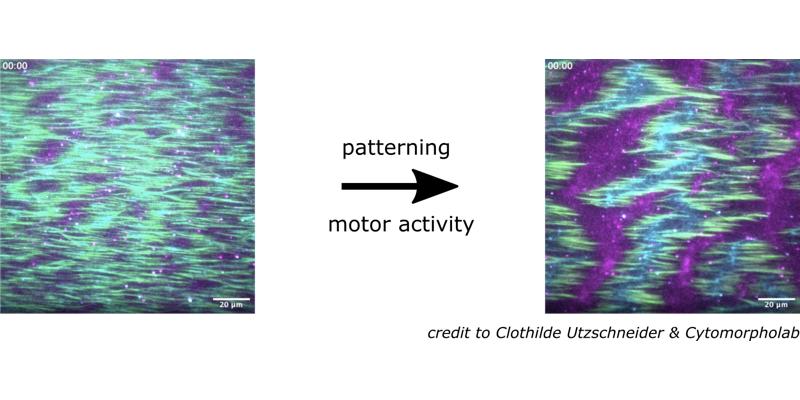- Share
- Share on Facebook
- Share on X
- Share on LinkedIn
Recruitment

We are looking to fill a Ph.D. position in the MC2 group at the Laboratoire Interdisciplinaire de Physique in Grenoble on modeling pattern formation in microtubule-motor assemblies.
Context:
Microtubules are key elements of the cytoskeleton of living cells, that participate in many cellular functions: long range active transport, cell division, and motility. To perform this multitude of functions microtubules need to dynamically adapt their spatial organization, a task which is believed to be a result of a self-organization process triggered by molecular motors. However, the cell possesses a multitude of motors with varying properties, which may favor different types of microtubule organizations.
Assemblies of microtubules and molecular motors are of form of active matter, which has been widely studied experimentally in vitro and theoretically in various settings. Recently, the Cytomorpholab group in Grenoble has identified the formation of stationary patterns in microtubule-motor assemblies on supported lipid bilayers, which rely on the presence of two types of competing processive motors. In this experimental system, stationary labyrinth-like patterns compete with active nematic microtubule flows depending on the concentrations of the two motor species.
The mechanism of pattern formation is yet unclear. The objective of this Ph.D. project is to explore in detail the macroscopic properties and underlying microscopic mechanisms of this dynamical pattern forming system.
Working environment:
This interdisciplinary joint experimental-theoretical project in collaboration with the Cytomorpholab group in Grenoble aims at understanding the origin of the spatial and temporal organization of microtubules in the presence of competing processive molecular motors. While experiments are conducted in parallel by a Ph.D student at the CEA Grenoble in the Cytomorpholab group, the prospective theoretical Ph.D. student at the LIPhy will work on the theoretical description of the experimentally observed phenomenon.
We offer an interdisciplinary research environment with a close collaboration between experimentalists and theoreticians. Grenoble is a dynamic city with a big university (Université Grenoble-Alpes) and
host to several big research facilities (CNRS, CEA, ILL, ESRF,...). Its unique location in the heart of the french Alpes makes it the ideal place for outdoor activities.
Requirements:
The successful applicant has a background in physics or life sciences with a strong interest in deciphering complex biological systems and mathematical modeling. Excellent written and oral communication skills (English) are desirable. Interested candidates are invited to contact Karin John (karin.john(at)univ-grenoble-alpes.fr) by email as soon as possible. They should provide: (1) a detailed CV, (2) the full transcript of their Master's degree(s), (3) a motivation letter describing past activities and research interests, and (4) contact information of 2 academic references.
Key words:
Biophysics, modeling, cytoskeleton, microtubules, molecular motors
Contact
Karin JOHN
MC2 team
karin.john univ-grenoble-alpes.fr (karin[dot]john[at]univ-grenoble-alpes[dot]fr)
univ-grenoble-alpes.fr (karin[dot]john[at]univ-grenoble-alpes[dot]fr)
- Share
- Share on Facebook
- Share on X
- Share on LinkedIn